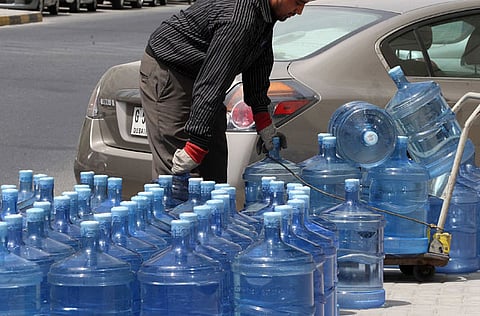UAE to tighten bottled water laws
Grace period extended to allow all companies to comply with new regulations

Dubai: Portable water manufacturers in the UAE will have until October 1 this year to comply with the new regulations issued by Emirates Standardisation and Metrology Authority (Esma).
The unified regulation was approved by UAE cabinet last year, through resolution 26 of 2013, following which companies had until April 1, 2014 to comply with the new rules.
However, after most firms were unable to comply with the new law, ESMA has decided to provide a grace period till October 1.
“There are 154 small and big drinking water producing and importing companies registered with us and so far we have found that only 18 firms comply with the new law. Many companies requested us to give them more time for compliance as well as consumption of existing stock,” said Mohammad Saleh Badri, Director General of Esma, speaking exclusively to Gulf News.
Of the 154 companies, Esma have audited 134 and the remaining 20 will be audited in the next couple of months.
The new regulations are designed to tackle potable bottled water and all materials that come in contact with drinking water. It also covers labelling and packaging of bottles as well as distribution.
“Every water producing and importing country should make sure they comply with our standards and have the Emirates Quality Mark on each bottle. Every bottle should also have correct labelling, for example if a bottle is labelled as mineral water, the content should be mineral water and nothing else,” added Badri.
The rules also govern the ingredients inside the bottle, which should be clearly mentioned on each bottle.
Another important aspect the new regulations cover is packaging and the material used.
“We are regulating the different materials that come into contact with drinking water, like coolers, bottles, containers, tankers, pipelines etc, to make sure these materials don’t contaminate drinking water. The material used for packaging and storing need to be of food contact grade,” said Badri.
The regulations require that water is safe, has necessary quality and the measure and weight of the bottles are accurate.
“What we have seen right now is that the bottles are of different sizes and shapes and many firms label their water as mineral, which may not be the case in reality. Through our process we want to make sure that the weight and measure is right as well and the consumers are being sold the right stuff,” informed Badri.
Esma has a dedicated team of inspectors who do random and unannounced checks in the factories. According to Esma, before authorising a firm to produce water, inspectors take random samples from the manufacturing units and make sure the production complies with all aspects of the regulations.
Firms not complying with the regulations will face penalties as high as Dh100,000 per offence and repeat offences could also lead to cancellation of licences.
The law covers all sizes of packaged water as well as water based products including ice packs.
Many companies have welcomed the move by the authorities to unify regulations and improve quality standards.
Renaud Marchand, Middle East Zone director of French firm Danone, which imports bottled water brands evian, Volvic and Badoit, said the new exercise will give consumers precise and correct information about the products.
“This means that we can only claim we are a “Natural Mineral Water” on our labels if we meet Esma’s approvals after they have conducted investigations into the source of our waters. Evian, Badoit and Volvic all meet these strict criteria and are therefore labelled ‘Natural Mineral Water’,” said Marchand.
He added that evian was the among first three factories to be visited by Esma members as part of the new regulations and the first company to be certified on November 11, 2013.
“As a company we are supportive of actions taken by local governments to protect and educate consumers to ensure a perfect understanding of the benefits and differences of the numerous brands of water currently in the market. It is critical to provide this knowledge to our consumers so they can better choose what suits them best,” he said.


